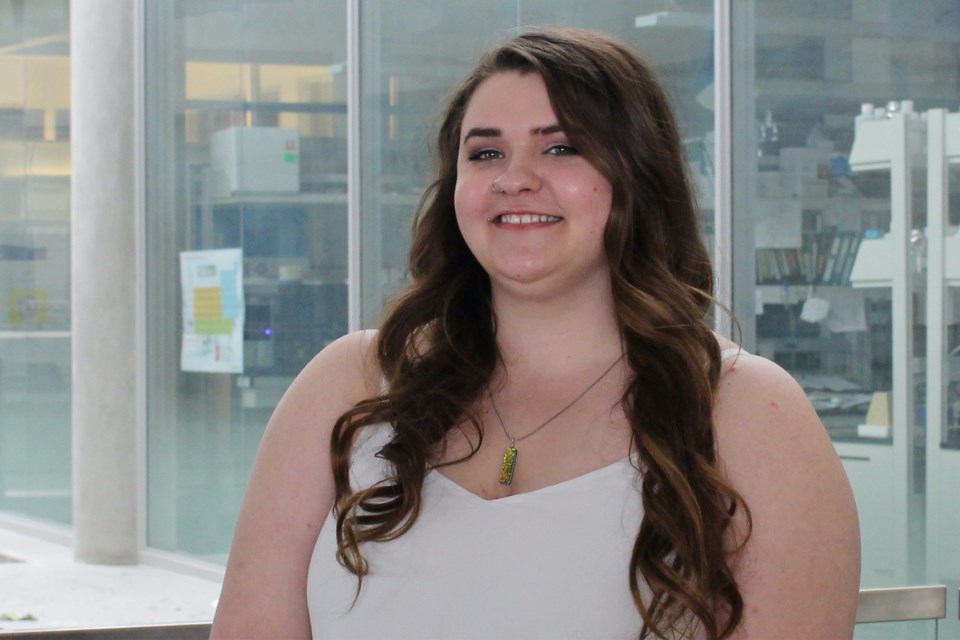OLDS — A student from Olds is a member of a University of Alberta (U of A) team that won silver in their category at a prestigious international genetic engineering competition in Paris France.
The competition, called the iGEM (international Genetic Engineered Machine) Grand Jamboree, was held Nov. 2-4. More than 240 teams from around the world participated.
Rachel Rieberger, a 22-year-old University of Alberta student studying molecular, cellular and developmental biology, served as a coordinator of the 17-member team.
She was one of five team members who made the trip to Paris to showcase their project. An advisor also made the trip. They competed in the over graduate category.
The team’s entry was a spray-on high-tech early warning system for farmers about potential diseases in their crops.
If a plant is sick and infected, specks from the spray will turn fluorescent red.
Another aspect of the project is a drone that can use artificial intelligence to scan a field to detect those telltale red specks and give farmers the exact co-ordinates of where they’re located.
Competing teams were each provided with a booth to display their project and 15 minutes to explain it on stage.
Rieberger told the Albertan that it was “exciting” to win silver.
"Of course, we were hoping for gold, but we're all very happy that we got silver, especially since this is the first team that the University of Alberta has had in quite a few years,” she said.
Another concern was “we didn't have as much support as we had thought that we were going to have, so it was a real struggle to get going.”
Rieberger said initially the team had difficulty getting support from the university because it hadn’t had an iGEM team on campus for a long time “so they just didn’t know about it.”
However, she said after some meetings, university officials did provide a lot of the necessary funding and other support.
Rieberger said the trade show portion of the event went really well.
"The booth was really good because we got to have one-on-one discussions with people that were interested in our research and what we were actually developing,” she said.
“A lot of them were very impressed. Our drone part is really flashy for that part of our project, so a lot of people were really interested in that.”
She said a promotional video they made for their project was also a “a really big attention grabber because “it was a bit more cinematic than a lot of the other promotional videos were. So that drew in a lot of people to come and talk with us about our project.”
Rieberger said they had opportunities to talk to people about Canadian agriculture and Albertan agriculture in particular, which was great, because that was a big focus of their project.
The team was pretty nervous when it came time to do their 15-minute presentation but that too went well.
Rieberger said it felt really good to reach the culmination of a project that began back in late February or March.
Although they were busy, the team actually did find time to tour Paris.
“We spent time trying to squeeze in as much tourism as we could, so we ended up doing a boat tour and seeing all the sites that way,” Rieberger said.
Her favourite bit of sightseeing was touring the catacombs, underground cemeteries that hold the remains of more than six million people.
“It was a little creepy,” she admitted, “but it was also just really enriched in history.”
The team didn’t make it back in Edmonton from Paris until the middle of the night. Rieberger had a class at 9 a.m. the next day but just couldn’t make it.
“That did not happen. I did not end up making it to class,” she said.
But the supervisor of the team did.
“She had to teach, so she made it into class to teach for 9:30,” Rieberger said.
Rieberger said she’d like to see the university put an iGEM team together next year.
She and many of her teammates can’t necessarily be involved directly in it as they will have graduated, but she’s hoping they can serve in an advisory capacity.
“We all definitely want to see the iGEM competition and the U of A iGEM team continue for years to come,” she said.



